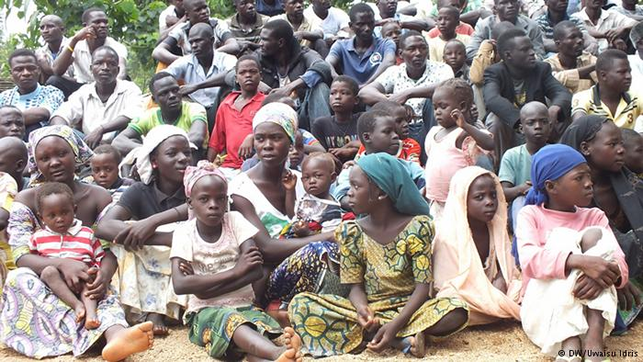Thousands of women who fled their homes to escape the bloody onslaught of Boko Haram terrorists in the North-East of Nigeria have accused the Nigerian security forces deployed to rescue them of taking undue advantage of them and subjecting them to starvation and sexual exploitation.
In a new report to be released today and obtained by New Telegraph, global human rights watchdog, Amnesty International (AI) said that rather than receiving protection from the troops deployed for counter-terrorism, these displaced women and young girls have been forced to succumb to rape in exchange for food.
The damning report, titled: “They Betrayed Us,” reveals how the Nigerian military personnel and Civilian Joint Task Force (Civilian JTF) – a militia group working alongside the troops separated women from their husbands and confined them in remote “satellite camps” where they have been subjected to all forms of inhuman treatment.
Director, Amnesty International Nigeria, Osai Ojigho, claimed that his organisation has evidence that thousands of people have been starved to death in the Internally Displaced Persons (IDP) camps in the war-ravaged zone since 2015.
“It is absolutely shocking that people who had already suffered so much under Boko Haram have been condemned to further horrendous abuse by the Nigerian military. Instead of receiving protection from the authorities, women and girls have been forced to succumb to rape in order to avoid starvation or hunger.
“Sex in these highly coercive circumstances is always rape, even when physical force is not used, and Nigerian soldiers and Civilian JTF members have been getting away with it. They act like they don’t risk sanction, but the perpetrators and their superiors who have allowed this to go unchallenged have committed crimes under international law and must be held to account,” said Osai Ojigho.
According to the report, the military engaged in gross abuse of human rights as troops ordered people living in rural villages to the satellite camps, in some cases indiscriminately killing those who remained in their homes.
The report also stated that the military screened everyone arriving at the satellite camps, and in some locations detained most men and boys aged between 14 and 40 as well as women who travelled unaccompanied by their husbands.
The detention of so many men has left women to care for their families alone.
The report contained the testimonies of several women, describing how they were raped and subsequently coerced into becoming mistresses or “girlfriends” to the soldiers which involved being available for sex on a regular basis.
Ama (not her real name), a 20-year-old woman narrated her ordeal in the hands of the soldiers thus: “They will give you food, but in the evening, they will come back about 5p.m. or 6p.m and they will tell you to come with them… One (Civilian JTF) man came and brought food to me. The next day, he said I should take water from his place (and I went). He then closed the tent door behind me and raped me. He said I gave you these things, if you want them, we have to be husband and wife.”
Ten others in the same camp said that they were also coerced into becoming “girlfriends” of security officials to save themselves from starvation. Most of these women had already lost children or other relatives due to lack of food, water and healthcare in the camp.
The sexual exploitation continues at an alarming level as women remain desperate to access sufficient food and livelihood opportunities.
Women said the sexual exploitation follows an organised system, with sol diers openly coming into the camp for sex and Civilian JTF members choosing the “very beautiful” women and girls to take to the soldiers outside. Women reported they were too afraid to refuse demands for sex, the report stated.
Amnesty International said it interviewed several witnesses at the camps who consistently reported that 15 to 30 people died each day from hunger and sickness between 2015 and 2016.
It also claimed that it got satellite images, showing how the graveyard inside the camp expanded quickly in these camps during this period.
A number of women who arrived in satellite camps in Dikwa town in mid-2017 have not received any food assistance since they arrived and described ongoing hunger, sickness and deaths within their camps.
Yanna (not her real name), who arrived in Dikwa in late-2017 and lived in Fulatari camp, told Amnesty International: “People are dying, (always there is a) burial, burial, burial. I was thinking maybe one day it will be my own.”
Zara (not her real name) said that rape by the soldiers and members of the Civilian JTF was common. She told Amnesty International of other cases she was aware of, including one where her neighbour accepted money from a soldier.
“He came back in the afternoon and met her sitting with her in-laws. He was looking at their faces one after the other to identify whom he gave money to. So he finally saw her and took her away with him… and had sex with her by force.”
Twenty-five-year-old Kale (not her real name) told Amnesty International she was raped on two occasions in the camp. She said: “There was a day (in or around April 2016), I was pregnant, and a soldier raped me. He knew I was five or six months pregnant. He said he saw me three times before. He didn’t offer me any food, he called me and I ignored him, but on the third day (after I ignored him), he forced me to a room and raped me.”
Kale said that she was also raped by another soldier when trying to collect water outside the camp: “Five of us went together, all of us were raped; the soldiers took us one by one when we came out of the camp. We told the other women and they said we won’t go to fetch water unless we are in a group of 20 or 30. We decided to go in large groups, so nobody touched us. But when we were just few, they raped us. It had happened to others as well.”
Thirty-year-old Miriam (not her real name), said to Amnesty International that when she arrived in the camp in late 2015, soldiers and Civilian JTF members stole the food meant for them, forcing women to have sex to access supplies.
She said: “First, we had some money which we brought from our vil lage. Then we sold all of our jewellery to buy food. Sometimes we were not given the food (intended for them), you will see they are even selling the food. They would bring a quarter (of the food meant for us) and sell the rest…
“If you want anything, they will tell you that you have to offer yourself. They will then give you food, when you offer yourself.”
Fanalpa (not her real name) told Amnesty International how she was forced to be the “girlfriend” of a member of the Civilian JTF and a soldier.
According to the report, she had arrived in the camp with her two children, one of whom died. She gave birth to a third child who also died a few months later, in early 2016.
Hence, she was desperate to find food for herself and her surviving child. She said: “People don’t have money to give (to soldiers or Civilian JTF for food), but a woman can offer herself, no money, just that.”
Fanalpa related that the soldier took her every two or three days for sex, to which she acquiesced out of desperation: “There is a military room inside the camp, maybe 120 metres away; there is a house that they gave to the military. He will invite me and I will go around eight and come back around one in the night, he will have sex two or three times. The soldier doesn’t stop. Even some of the other women will be called… If they see a woman bathing and she is pretty, they will call her.”
Thirty-year-old Khadeeja (not her real name) said five of her family members died in the camp from hunger and sickness.
She told Amnesty International that women approached by soldiers and Civilian JTF members could not afford to refuse demands for sex: “If you say you are a woman and that you will stay with your family, you will die and your children will die. You have to be the ‘girlfriend’ of a Civilian JTF. If you are a ‘girlfriend’, you get everything. If you don’t, you won’t get anything. There is no food or water unless you are a ‘girlfriend’ of the Civilian JTF.”
Thirty-year-old Halima (not her real name) described to Amnesty International how she was approached for sex by a soldier who had been involved in torturing her husband by beating him while he was suspended from the ceiling during interrogation on their arrival in Bama prison.
She said: “(He) started coming to me, he said he loves me and that my husband won’t come back as he is in Giwa… He would bring food, chicken and yam to me. He says I am his ‘wife’… The soldiers are kings in Bama, when you see them, everybody is afraid. They decide, they say nobody should complain, so I did what he wanted… That time, the majority of women were taken by the soldiers. They take (for sex) who they like and leave what they don’t like.”
Women have not been allowed to return to their villages of origin. Several told Amnesty International that they were desperate to return, either to escape the camp, and/or because they wanted to reunite with family members who had remained behind and who, in some cases, they had not seen for several years.
Although the United Nations and several humanitarian organisations have increased their assistance to victims of the crisis, large-scale corruption has prevented many people from accessing food, water and medicines.
.new telegraph













